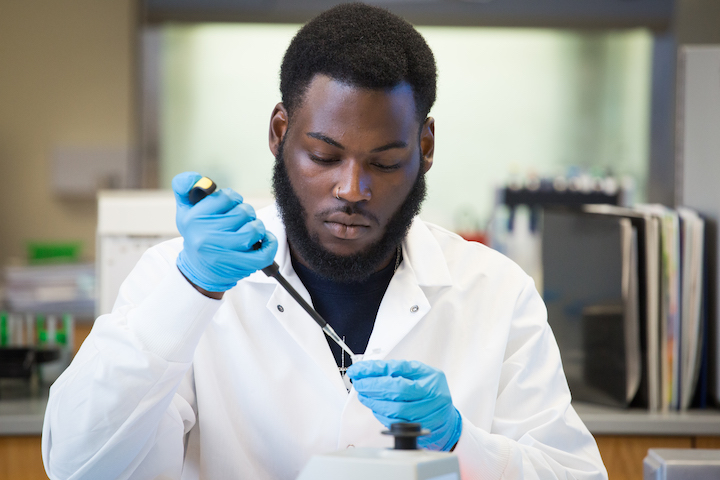Ri’Shawn Bassette is studying other Longwood students’ saliva this summer.
Quirky obsession? Probably—unless you happen to be interested in studying anxiety disorders, as Bassette is.
A treasure trove of biological information can be extracted from saliva, including a person’s ability to manage stress. Along with Dr. Catherine Franssen, Bassette ’17, of Hampton, is measuring the presence of three stress-related hormones in saliva samples provided by 54 students on two occasions—before an exam and on a typical day. The labwork, part of a PRISM project on alternative therapies in treating and preventing anxiety disorders, will help the researchers develop a "stress profile" on each student.
"We want to know how our students are handling stress," said Franssen, a neurobiologist whose academic interests include stress, fear and anxiety. "We want to see how much stress hormone is released and whether people can have different responses to stress.
"What is more important in our research than the amount of these three hormones is the role of things like nutrition habits and exercise in stress management. For example, if you exercise more or are on a healthy diet, do you have less test anxiety? Is there a relationship between behaviors and stress management? Although there is a lot of evidence that exercise reduces stress, there isn’t a lot of biomedical science on the specific effects of different kinds of exercise and being outside versus inside. These are key questions to understand new therapies."
Franssen has used saliva samples in her research for several years, having learned the method in a two-day workshop—"spit camp," she calls it—sponsored by Salimetrics, a leader in salivary bioscience, in 2009. Samples are obtained by subjects drooling into a small tube that resembles a straw. The samples are placed in a centrifuge that spins them around, separating liquids from solids, then the liquid samples undergo a test (enzyme-linked immunosorbent assay, or ELISA) that identifies substances by changing color.
"Saliva has the same stuff that’s in your bloodstream, and the extraction process is less invasive than taking blood," said Franssen, who specializes in neuroendocrinology and teaches in the psychology department.
This part of the research is looking at the hormones cortisol, alpha-amylase and DHEA. "We know that cortisol is a major stress hormone that turns on and maintains adrenaline and stays on for longer periods than adrenaline," said Franssen, who teaches a course on the psychobiology of stress. "There is less research about alpha-amylase, which might be a better stress marker than cortisol. DHEA, which we’re also not as familiar with, has neuroprotective effects and is related to one’s resiliency to stress."
The research is about more than what’s in saliva, though. Bassette will look at different ways of treating or preventing anxiety, especially alternative treatments such as yoga or wilderness therapy.
"Nobody seems to be looking at the effects of alternative therapies," said Franssen. "One treatment group, Heroes on the Water, takes wounded veterans kayak-fishing for healing and rehabilitation. Does this experience help, and, if so, how does it help? Is treatment changing something about how people respond to stress?
"We also want to better define these different types of treatment; the topic is even less studied than I thought it was. The literature on alternative therapy for mental health disorders is scattered and ill-defined."
Bassette is double-majoring in psychology and communication studies, not any of the sciences, but he is catching on quickly to lab research. "I’m enjoying the learning aspect of the project. I feel like I’ve learned so much," he said. "Dr. Franssen taught me a lot of [scientific] jargon that I didn’t know because my background is not in science. I don’t know what I’ll study in grad school, but I know this experience will be helpful."
Franssen also welcomes the research opportunity that PRISM offers. "This project is a chance to start something new," she said. "It has been on my mind for some time, but I haven’t had the time or the resources to get it off the ground. Younger and younger people are being diagnosed with anxiety disorders such as panic attacks and generalized anxiety, so this is an important research topic."



Leave a Comment